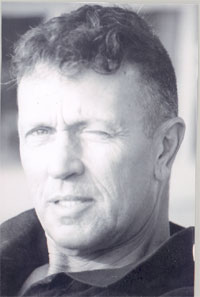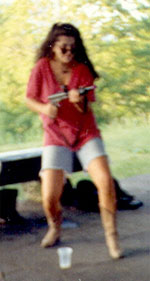Wergle Flomp Humor Poetry Contest 2005
Congratulations to the winners of our 2005 humor poetry contest!
Honorable Mention $38
- Jennifer Biggs, Annabel Lee; Revised, Poetry
- Apryl Hutson, Shall I compare thee, love, to Britney Spears?, Poetry
- Robert Klaslo, I Once Closed My Eyes, Poetry
- Garrett Marcus, The Emerald Vs. the Queen, Poetry
- Peter Taylor, Leedabole and the Froggy-Hopple, Poetry
Thanks to everyone who entered our 2005 Wergle Flomp Poetry Contest. We received 1,398 entries, up from 975 last year and a fresh record. Poets aren't usually on the cutting edge of social trends (we know some of you are still wearing plum velvet smoking jackets), so we were excited to discover last week that the ever-more-popular pastime of spoofing the vanity contests has caught the attention of Newhouse News Service (Dru Sefton, "If I'm as Bad as I Can Be, Won't You Please Not Publish Me?").
"In the spring a livelier iris changes on the burnish'd dove", according to Tennyson (props to anyone who can tell me what that means), and in the spring your judge must once again cloister herself in her garret with hundreds of poems. Very, very bad poems. Poems so bad...they're good.
A bad poem becomes funny by virtue of its earnestness. It's trying so hard to be a good poem, and failing. The more ambitious its original intentions, the funnier its pratfall appears. Self-conscious clowning isn't as entertaining as a pyramid of acrobats felled by an untimely sneeze. "I can't believe anyone tried to do that," you say, amusement mingling with unwilling admiration. "That" might be writing a paean to a 7,000-lb cheese, or an elegy for a "dear little angel" who "choked on a piece of beef".
What makes these poems gems of badness is that the narrative voice is utterly unaware of the incongruities of subject, tone and language that spoil the poem's effect. Yet there's enough poetic skill on display to hint at what the poem could have been, which increases the humorous effect of having those expectations frustrated.
This interplay of conflicting styles and voices creates the madcap humor of "Blaming of Parts", our first-prize poem. Dr. Farrell perfectly captures the expletive-laced patter of a drill sergeant who doesn't know whether to laugh or cry at the idiocy of both his distant commanders and his hapless recruits. Bizarrely interspersed with this narrative, we hear the languid, effete voice of the Poet describing the pretty nipa palms. This poem, of course, is a parody of Henry Reed's famous war poem "Naming of Parts", which contrasts the beautiful, lively world of nature with the sterile and cramped mentality of the warmaking machine. Whereas in Reed's poem, incongruity serves a serious political purpose, Dr. Farrell comically exaggerates that incongruity to create a more affectionate portrait of the military. He also uses the f-word a lot, which means that once again, our winner gets the coveted NC-17 label. Don't forward it to granny.
We didn't want Wergle to become exclusively a parody contest, so we were excited to find Kakie Mashburn's "Phunny Pharm", our second-prize winner. The creative rhymes in this poem are worthy of Ogden Nash, and informative too. Now I know which of my spam emails to answer. "To treat those wacky spin-offs of depression - / I.e., for those who suffer from attacks/ Of panic, sleeplessness, or mild aggression/ God created something called Xanax." Ms. Mashburn is our first repeat honoree. She received an honorable mention last year for an ode to junk food.
Our third-prize winner, Yuri Constringe's "The Tight Thong of J. Alice Prufrock", has many exquisite lines, especially in the first half. "We are ho's, then, you and I,/ With our rears spread out down to our thighs/ Like blowfish seeking darker waters". I've mentioned before that I'm a sucker for T.S. Eliot parodies, not just because he's one of my major influences as a serious (too-serious) poet, but also because so many of these parodies are really funny. Like Edgar Allan Poe, he skirted the line between greatness and badness so often that it doesn't take much tweaking to turn one of his poems into a pompous, cringe-worthy mess.
The deadline for our 2006 contest, as always, is April Fool's Day. We have a fresh $1,609 to give away and entry is free. Enter the new Wergle Flomp contest now.
Contest Judge

Jendi Reiter
Jendi Reiter is vice president of Winning Writers, editor of The Best Free Literary Contests, and oversees the Winning Writers literary contests. Jendi is the author of the novel Origin Story (Saddle Road Press, 2024), the short story collection An Incomplete List of My Wishes (Sunshot Press, 2018), the novel Two Natures (Saddle Road Press, 2016), the poetry collections Made Man (Little Red Tree Publishing, 2022), Bullies in Love (Little Red Tree Publishing, 2015), and A Talent for Sadness (Turning Point Books, 2003), and the award-winning poetry chapbooks Swallow (Amsterdam Press, 2009) and Barbie at 50 (Cervena Barva Press, 2010). Awards include a Massachusetts Cultural Council Artists' Grant for Poetry, the 2016 New Letters Prize for Fiction, the 2016 Rainbow Award for Best Gay Contemporary Fiction, the 2015 Wag's Revue Poetry Prize, the 2013 Little Red Tree International Poetry Prize, the 2012 Betsy Colquitt Award for Poetry from Descant magazine, the 2011 James Knudsen Editor's Prize in Fiction from Bayou Magazine, the 2011 OSA Enizagam Award for Fiction, the 2010 Anderbo Poetry Prize, and second prize in the 2010 Iowa Review Awards for Fiction. Jendi's work has appeared in Poetry, The New Criterion, Mudfish, Passages North, Cutthroat, Best American Poetry 1990, and many other publications. See their interviews in RoundPier and Lammergeier.
Photo by Ezra Autumn Wilde









